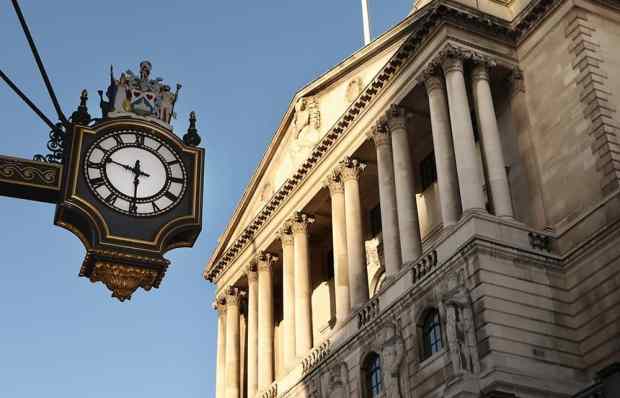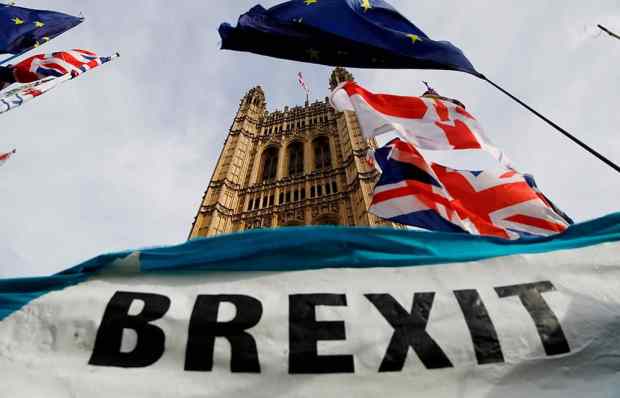‘Who’s to blame for financial crisis’ is a poem I wrote in 2012, rhyming ‘speculators, spivs and traders’ with ‘rich, -uncaring hedge-fund raiders’, while taking passing swipes at Gordon Brown and ‘Mervyn King, who really didn’t do a thing’. But it’s too early in 2016 to update my ditty, because the new crisis — if that’s what it is — hasn’t really hit us yet, except in share prices that clearly have further to fall. And the question of who’s to blame, never mind how to make them rhyme, is going to be a lot more difficult this time round.
‘It’s China’s fault,’ was the gist of bulletins about the loss of 750 jobs at Tata’s Port Talbot steelworks this week. Dumping of cheap Chinese steel on world markets, combined with falling Chinese domestic demand, has turned the rump of the UK steel industry from a marginal survivor with marketable specialist skills into what looks increasingly like a basket case which no government action could revive. It’s China’s fault too that stock markets are so jittery, taking their cue from the Shanghai exchange — which really is a fiefdom of ‘speculators, spivs and traders’, unrestrained by state intervention. But fault lies also with world trade negotiators for failing to stop the dumping, with western leaders (including George Osborne) for toadying fruitlessly to Beijing, and with a vast gallery of pundits for overhyping China’s prospects in the first place.
Is cheap oil bad?
As for oil, it’s Saudi Arabia’s fault that the price is so low, having kept pumping while global demand was faltering; but it seems harsh to make Iran share the blame for adding another half-million barrels a day to the glut, having been allowed back to market after meeting a promise to start dismantling its nuclear capability. That is, or should be, a step towards regional stability; and anyway cheap oil doesn’t provoke economic crises. Quite the reverse: every recession of the past four decades has been preceded by an upward spike in the barrel price — including its $147 peak in July 2008.
Economists who have relied on that model throughout their careers are now having to reinterpret ultra-low energy prices, not as a catalyst for further recovery, but as a harbinger of even lower demand as downturn takes hold. Beyond that, the dip below $30 has brought fears of bad debts for banks that have lent heavily to oil and gas players, particularly in US shale — and of critical energy shortages in a decade’s time because so many current exploration projects have had to be put on hold.
So it’s also the fault of oil companies, and banks that lend to them? Maybe, but hands up anyone who didn’t think the turmoil that followed the Arab Spring heralded an era of $100-plus oil and disrupted Middle East supply, to which US shale gas was a God-given answer. Which reminds us that ‘blame’ is best applied to those who behave badly, rather than those who guess wrongly.
Dad’s Army revival
Have our high-street banks, house–buyers and consumers been behaving badly? There’s a looming debt crisis abroad, we gather, but not here: Governor Carney says ‘this is not a debt-fuelled recovery’ even though ‘vigilance is required’ in relation to rising household borrowings. Our banks have been busy rebuilding their balance sheets, and if they deserve stick it’s for not lending enough to smaller businesses. Our house prices keep bubbling, but that’s because of foreign cash at the top and too few houses at the bottom, not crazy mortgages. When blame does come to rest in the financial world this time round, I suspect it will be on central bankers like Carney for keeping rates too low for too long, and distorting asset prices with too much QE.
But let’s watch and listen: the Dad’s Army platoon of financial-disaster commentators is reporting for duty again. Here’s Danny Blanchflower on Skype from New Hampshire; Lord Turner is in the radio car; Paul Mason of Channel 4 News has grown a grisly beard, the better to resemble an Old Testament prophet. Only one familiar, swooping, vowel-strangling voice is missing, having last been heard rambling on ITN about the Corbyn reshuffle. Come back Robert Peston, your country needs you.
A new tension
Economic change is about conflicting forces: supply versus demand in oil, steel and every-thing; local heroes versus City villains and Westminster blunderers; domestic momentum versus global headwinds. In relation to the last of those, I’m cheered by a forecast from the well-respected Ernst & Young Item Club that the UK economy is still capable of growing at 2.6 per cent in 2016, boosted by exports, and that with low inflation and eased welfare cuts, consumer spending will increase by 2.8 per cent. But three weeks into a year in which forecasting is clearly going to be an even more dangerous game than usual, I sense a new conflict on the home front: between the reinvigorated and the demoralised.
Everywhere I see established businesses that were strong enough to ride the recession now doing well, many taking on more staff; entrepreneurs energised by new ventures; housebuilders going hell for leather; the voluntary sector, strengthened by necessity, doing good work on all fronts. Then I see public services (whether or not still in public ownership) traumatised by funding cuts, restructurings, insensitive top-down decision-making and the blame culture: libraries and post offices under threat, local government in retreat, doctors striking, taxpayer dissatisfaction rising like the flood waters to which the state’s response looked so inadequate.
That second trend threatens to overwhelm all the feelgood that might have come from the first, so that we might find the peak of the recovery has passed before we even noticed it. How is it where you live? Do tell me: martin@spectator.co.uk.
Got something to add? Join the discussion and comment below.
Get 10 issues for just $10
Subscribe to The Spectator Australia today for the next 10 magazine issues, plus full online access, for just $10.















Comments
Don't miss out
Join the conversation with other Spectator Australia readers. Subscribe to leave a comment.
SUBSCRIBEAlready a subscriber? Log in